
The Duke Department of Neurology has released Annual Reports detailing their successes, challenges, and opportunities in 2023, 2021, 2019, 2017, and 2016. These reports are available in both print and PDF formats.
Duke Neurology Annual Reports
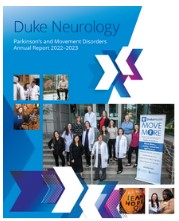
Our 2023 Annual Report focuses on our Division of Parkinson's and Movement Disorders. Highlights include efforts to improve deep brain stimulation to act as a "smart thermostat for the brain," Greg Monroe's story of coming to terms with his Parkinson's diagnosis, Duke becoming the country's second center of excellence for dystonia, and an $18 million Duke grant to study the origins of Parkinson's disease.
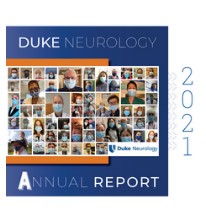
Our 2021 Annual Report covered the Duke Neurology Department's response to the emerging COVID-19 pandemic, as well as the continued growth of our missions of improved clinical care, advancing clinical and translational neuroscience research, and training the next generation of neurologists. Highlights include profiles of our expanded headache clinic, Duke Comprehensive Epilepsy Center and neurocritical care unit, new research into Alzheimer's disease, stroke, and epilepsy, and our residency, fellowship and advanced practice provider residency programs.
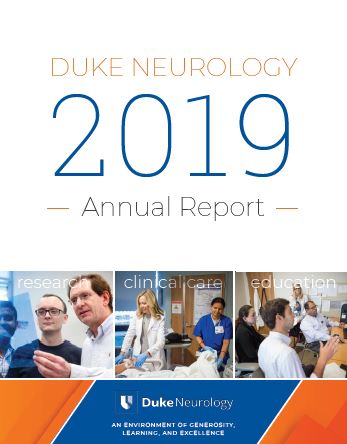
Our clinical updates followed an ALS patient who continued a lifelong hobby of scuba diving consulting with our neurologists Janice and Wayne Massey, MD, discussed a new Circulation article by Shreyansh Shah, MD, that uncovered an important contributor to stroke-related death and disability, and highlighted a national 2018 Medscape survey that listed Duke University Hospital as a top national location for stroke, multiple sclerosis, and ALS.
Our research updates discussed a new effort by Ornit Chiba-Falek, PhD to fine-tune genes to treat Parkinson's, a new study by Ying Xian, MD, PhD, and Daniel Laskowitz, MD, MHS, answering a dilemma about how to treat patients with stroke and atrial fibrillation, and a study by Al La Spada, MD PhD, that pioneers a new form of therapy to restore vision in a previously untreatable form of progressive vision loss.
Our education update discusses our expanded residency program, our fellowships in eight sub-specialties in neurology, and advance practice provider (APP) residency program, which has become a national model for improving the quality and availability of neurological care.
And our new alumni spread followed the advances made around the country (and world) by our former residents and fellows.
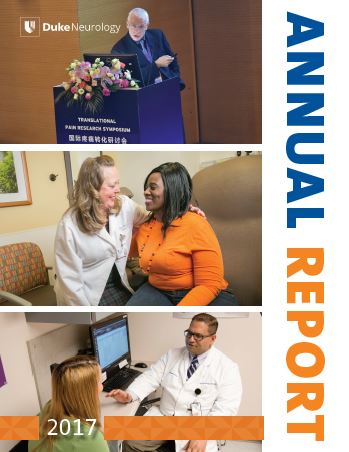 Our second annual report's "What is Duke Neurology?" feature reviewed the clinics, hospitals, laboratories, and other facilities that make up our Department.
Our second annual report's "What is Duke Neurology?" feature reviewed the clinics, hospitals, laboratories, and other facilities that make up our Department.
Our clinical section told the story of Ryley Hopper, a college sophomore who was treated by our neurologists and a team of clinical experts in our neuro Intensive Care Unit after a pool accident shattered one of his vertebra, discussed the work that Joel Morgenlander, MD, and other Duke experts in head trauma have worked to evaluate retired football players in the National Football League, and shared how Brad Kolls, MD, PhD, and Carmelo Graffagnino, MD, are leading an effort to improve stroke care both at Duke and throughout the Southeast.
Our research section covered Rick Bedlack's, MD, PhD, efforts to offer a faster, patient-centric approach for ALS research through his Replications of ALS Reversals (ROAR) trial, discussed how Al La Spada, MD, PhD, is working to develop the first treatments for neurodegenerative diseases, and shared research highlights relating to multiple sclerosis, neurons that help the body form habits, and Parkinson's disease.
Our education section discussed our efforts to provide training in all areas of general and subspecialty neurology to residents, fellows, and advanced practice providers.
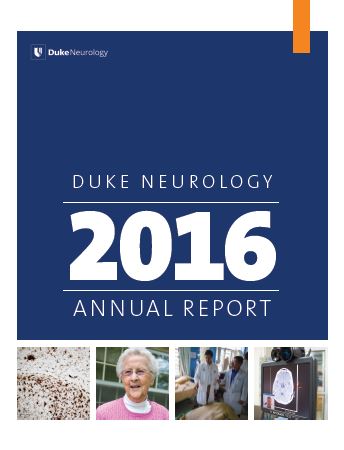 Our first annual report contained three stories highlighting our missions to advance neurological research, train the next generation of neurologists, and provide the best possible clinical care:
Our first annual report contained three stories highlighting our missions to advance neurological research, train the next generation of neurologists, and provide the best possible clinical care:
- “Unlocking Alzheimer’s disease” focused on the research of Carol Colton, PhD, who is investigating how an unexpected culprit--the body’s immune system--may play a major role in the formation of Alzheimer’s disease.
- "Opening eyes in Eldoret” followed two of our stellar graduating residents, Chen Lin, MD, and Ravi Vakani, MD, who traveled to Eldoret, Kenya, to help doctors there provide better neurological care.
- “Getting the best stroke care--wherever you are” told the story of Juanita Grant, a Danville, Virginia, stroke patient who received life-saving care thanks to our telestroke network, which allows our doctors to remotely provide Duke-level stroke care to patients across North Carolina and Virginia.
- “Cultivating innovation” explored the Clinical Laboratory Interface Program, or CLIP, a multidisciplinary group investigating new potential breakthrough therapies for traumatic brain injury and other conditions.